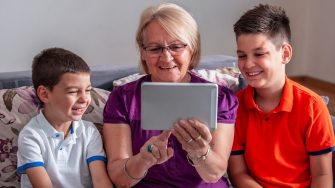Intergenerational Programs – Do They Tackle Social Isolation In Older People?
Institute members have researched the feasibility and impact of a 10-week intergenerational program between older adults and preschool children.
Institute members have researched the feasibility and impact of a 10-week intergenerational program between older adults and preschool children.

Social isolation in older people is a growing health concern globally. Research indicates that older people who maintain strong social ties and active community involvement experience better health outcomes, including enhanced cognitive and physical function, and are less susceptible to frailty. However, heightened levels of social isolation correlate with increased mortality rates, diminished functional abilities and reduced physical activity. In addition, higher levels of social isolation are associated with significantly higher risks of developing dementia or cognitive decline.
Given the complex challenges caused by social isolation, there is an urgent need for interdisciplinary interventions to address social isolation. Australia has been making strides in integrating intergenerational programs into communities as a proactive measure. These programs bring together bring non-familial older people and children together to engage in purposeful joint activities for mutual benefit – including mitigating feelings of loneliness and anxiety in older people and creating dynamic learning environments for younger people.
However, there is a need for further rigorous research to evaluate the impact of intergenerational programs, as well as a growing demand for evidence-based frameworks to deliver these programs sustainably and effectively within communities.
To address these gaps, the Intergenerational Clinical Trial In at-risk Older adults and pre-school childreN (INTERACTION) was conducted in Sydney, New South Wales. The trial aimed to assess the feasibility and acceptability of a 10-week intergenerational program for community-living older adults and preschool children. UNSW Ageing Futures Institute member Dr Mae Lim is an investigator on the project.
“Key findings from the trial revealed that running such programs in community spaces, led by experienced educators is feasible. Participants showed good attendance rates, with positive feedback on program activities and interactions. We identified challenges such as recruitment criteria adjustments and cognitive testing complexities. However, these are outweighed by the enormous potential of intergenerational initiatives to enhance physical, psychological, and social well-being among older adults.” says Dr Lim
“Building on our previous worka,b and the success of the INTERACTION trial, our team is now running a large-scale efficacy trial to further explore the impact of intergenerational programs on health outcomes in community-living older adults. By fostering meaningful connections between generations, we can potentially combat social isolation in older Australians and promote holistic well-being across communities.”
Read the full journal article here
a) Peters, R., Ee, N., Ward, S. A., Kenning, G., Radford, K., Goldwater, M., ... & Rockwood, K. (2021). Intergenerational programmes bringing together community dwelling non-familial older adults and children: A systematic review. Archives of gerontology and geriatrics, 94, 104356.
b) Kenning, G., Ee, N., Xu, Y., Luu, B. L., Ward, S. A., Goldwater, M. B., ... & Peters, R. (2021). Intergenerational practice in the community—what does the community think?. Social Sciences, 10(10), 374.